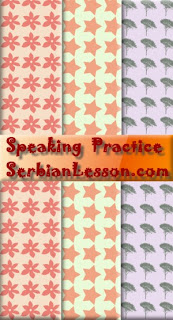This is the third part of the series of blog posts about the word order or "red reči" in a Serbian sentence. I covered the word order in the present tense and past tense and today's topic is the future tense. If you find the letter N next to the sentence, it means that it is the most neutral / natural sounding sentence:
One word verb: pevati (to sing)
Future tense of PEVATI (to sing): "I'll sing."
Subject (S) + predicate (P)
S + P + direct object (dO)
S + P + dO + adverb of time (AoT)
One word verb: pevati (to sing)
Future tense of PEVATI (to sing): "I'll sing."
Subject (S) + predicate (P)
- Pevaću. N
- Ja ću pevati.
- Ti ćeš igrati, a ja ću pevati. N
- Sedećeš i slušaćeš, a ja ću pevati. N
- Prijatelji su čuli kako ću pevati na koncertu. N
- Priznajem da ću pevati na koncertu. N
S + P + direct object (dO)
- Pevaću pesmu. N
- Ja ću pevati pesmu.
- Čuće oni kako ću im otpevati pesmu. N (im= njima= to them, indirect object)
- Svi su čuli da ću pevati tu pesmu. N
S + P + dO + adverb of time (AoT)
- Pevaću pesme svaki dan. N
- Svaki dan ću pevati pesmu. N
- Moji prijatelji su pitali kada ću pevati pesmu sledeći put. N
S + P + dO + AoT + AoP (adverb of place)
- Pevaću pesmu svaki dan kod kuće. N
- Pevaću pesmu kod kuće svaki dan. n
- Svaki dan ću pevati pesmu kod kuće. N
- Kod kuće svaki dan ću pevati pesmu.
- Moje komšije će sutra čuti zašto ću kod kuće pevati pesmu. N
- Moje komšije će čuti zašto ću pevati pesmu za nedelju dana kod kuće. N
- Moje komšije će igrati uz iks-boks dok ću ja pevati pesme uz xbox kod kuće za nedelju dana. N

.png)




















